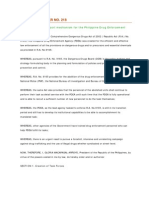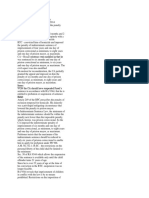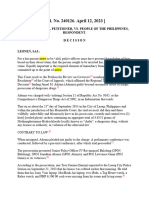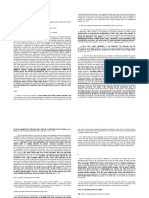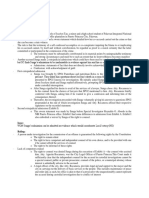Crim - Baclayon V Mutia
Crim - Baclayon V Mutia
Uploaded by
Pam RamosCopyright:
Available Formats
Crim - Baclayon V Mutia
Crim - Baclayon V Mutia
Uploaded by
Pam RamosOriginal Description:
Original Title
Copyright
Available Formats
Share this document
Did you find this document useful?
Is this content inappropriate?
Copyright:
Available Formats
Crim - Baclayon V Mutia
Crim - Baclayon V Mutia
Uploaded by
Pam RamosCopyright:
Available Formats
Florentina L. Baclayon vs Hon. Pacito G.
Mutia, as Presiding Judge of the Municpal Court of
Plaridel, Misamis Occidental and People of the Philippines
[G.R. No. 59298. April 30, 1984]
Facts:
Petitioner, Florentina L. Baclayon was convicted of the crime of Serous Oral
Defamation for having quarreled with and uttered insulting and defamatory words
against Remedios Estillore, principal of the Plaridel Central School.
The CA/IAC affirmed her conviction and increased the penalty imposed by respondent
judge and sentenced her to 1 year 8 months 21 days of arresto mayor in its maximum
period to 2 years and 4 months of prision correccional in its minimum period.
The sentence was promulgated on September 9, 1981, and on the same date Baclayon
applied for probation with respondent judge who referred the application to a
Probation Officer. The Post-sentence Investigation Report favorably recommended the
granting of petitioner’s probation for a period of 3 years.
On Dec 21, 1981, respondent Judge issued an order granting Baclayon’s probation by
modified the Probation Officer’s recommendation by increasing the period of
probation to 5 years and imposed some condition.
One of the condition was, “to refrain from continuing her teaching profession,” to
which Baclayon contends; alleging grave abut of discretion in the imposition of the said
condition. She submits that said condition is not only detrimental and prejudicial to her
rights but is also not in accordance with the purposes, objective and benefits of the
probation law and prays that said condition be deleted from the order granting her
probation.
ISSUE:
W/N the respondent judge acted in grave abuse of discretion in giving the assailed condition?
Held:
YES.
The enumeration of conditions contained in Section 10 of the Probation Law is not
inclusive. Probation statutes are liberal in character and enable courts to designate practically
any term it chooses as long as the probationers constitutional rights are not jeopardized. There
are innumerable conditions which may be relevant to the rehabilitation of the probationer
when viewed in their specific individual context. It should, however, be borne in mind that the
special or discretionary conditions of probation should be realistic, purposive and geared to
help the probationer develop into a law-abiding and self-respecting individual. Conditions
should be interpreted with flexibility in their application and each case should be judged on its
own merits — on the basis of the problems, needs and capacity of the probationer. The very
liberality of the probation should not be made a tool by trial courts to stipulate instead
unrealistic terms.
An order placing defendant on “probation” is not a “sentence” but is rather in effect a
suspension of the imposition of sentence. It is not a final judgment but is rather an
“interlocutory judgment” in the nature of a conditional order placing the convicted defendant
under the supervision of the court for his reformation, to be followed by a final judgment of
discharge, if the conditions of the probation are complied with, or by a final judgment of
sentence if the conditions are violated.
You might also like
- African Customary Law in South AfricaDocument89 pagesAfrican Customary Law in South AfricaShalom Ndiku100% (1)
- Syllabus For Peace and Global EducationDocument10 pagesSyllabus For Peace and Global EducationThales david80% (5)
- Probation Law Digested CasesDocument15 pagesProbation Law Digested CasesNin Ja100% (27)
- Negotiable Instruments Used As Collateral SecurityDocument5 pagesNegotiable Instruments Used As Collateral Securityaweb1100% (2)
- Case Digest - ProbationDocument10 pagesCase Digest - Probationmikki meg100% (1)
- Criminal Cases DigestsDocument6 pagesCriminal Cases DigestsAngeline Rodriguez100% (1)
- Lourdes A. Sable Vs People of The Philippines G.R No. 17796, April 7, 2009Document1 pageLourdes A. Sable Vs People of The Philippines G.R No. 17796, April 7, 2009Wena Mae CristobalNo ratings yet
- The Crime Prevention Programs Implemented by Tangub City Police StationDocument5 pagesThe Crime Prevention Programs Implemented by Tangub City Police StationKenneth TumulakNo ratings yet
- US V EvangelistaDocument2 pagesUS V Evangelistaalexis_beaNo ratings yet
- Pre-Finals NotesDocument34 pagesPre-Finals NotesJovie MasongsongNo ratings yet
- Motion To DismissDocument3 pagesMotion To DismissPam Ramos100% (2)
- Legal MemorandumDocument2 pagesLegal MemorandumPam Ramos100% (3)
- Fisher Vs Bell Case StudyDocument6 pagesFisher Vs Bell Case StudyRahul CmrNo ratings yet
- Labor Case DigestDocument2 pagesLabor Case DigestJhollinaNo ratings yet
- Chapter 1 - Introduction To Torts LawDocument28 pagesChapter 1 - Introduction To Torts LawLuqman Hakeem100% (4)
- Bala vs. MartinezDocument4 pagesBala vs. MartinezVloudy Mia Serrano Pangilinan100% (1)
- Budlong vs. ApalisokDocument3 pagesBudlong vs. ApalisokVloudy Mia Serrano PangilinanNo ratings yet
- Florentina L. Baclayon, vs. Judge Mutia: Relevant FactsDocument2 pagesFlorentina L. Baclayon, vs. Judge Mutia: Relevant FactsSophiaFrancescaEspinosa100% (1)
- Bala Vs MartinezDocument2 pagesBala Vs MartinezAnthony Tamayosa Del AyreNo ratings yet
- People of The Philippines vs. Noel Bartolome - Abadano, Junnifer C.Document1 pagePeople of The Philippines vs. Noel Bartolome - Abadano, Junnifer C.Lemrose DuenasNo ratings yet
- People vs. Daniel, G.R. No. L-40330, November 20, 1978Document10 pagesPeople vs. Daniel, G.R. No. L-40330, November 20, 1978Edgar Joshua Timbang100% (1)
- People v. XXX, Alfredo Gilles, Niño G. MonterDocument2 pagesPeople v. XXX, Alfredo Gilles, Niño G. MonterRey Malvin SG PallominaNo ratings yet
- SPL DIGESTS - Jaime Chua Ching vs. Fernando Ching, GR No. 240843, June 3, 2019Document2 pagesSPL DIGESTS - Jaime Chua Ching vs. Fernando Ching, GR No. 240843, June 3, 2019Emman FernandezNo ratings yet
- People v. Almazan (Treason)Document2 pagesPeople v. Almazan (Treason)Ann ChanNo ratings yet
- Robbery With Homicide, G.R. No. 206227, 08312016 - SET ADocument2 pagesRobbery With Homicide, G.R. No. 206227, 08312016 - SET AJay jogsNo ratings yet
- TOLENTINO v. ALCONCELDocument1 pageTOLENTINO v. ALCONCELWena Mae Cristobal67% (3)
- Objectives of PolygraphExamination in Criminal Investiation and Significant Points in Polygraph ExaminationDocument4 pagesObjectives of PolygraphExamination in Criminal Investiation and Significant Points in Polygraph Examinationgenelord opallaNo ratings yet
- Soriano V CA DigestDocument2 pagesSoriano V CA DigestMary Louise R. Concepcion75% (4)
- CHAPTER 4 - Basic Numbering System of Police ReportsDocument4 pagesCHAPTER 4 - Basic Numbering System of Police ReportsAilyne CabuquinNo ratings yet
- TCMP 2Document24 pagesTCMP 2Carlo SalvadorNo ratings yet
- People of The Philippines Vs Armando ReanzaresDocument6 pagesPeople of The Philippines Vs Armando ReanzaresLyka SebastianNo ratings yet
- People vs. CedenioDocument1 pagePeople vs. CedenioGENEVIE TALANGNo ratings yet
- People Vs AdornoDocument18 pagesPeople Vs AdornoAswigue LloydNo ratings yet
- Spot ReportDocument7 pagesSpot ReportFaisal SultanNo ratings yet
- People of The Philippines, G.R. No. 197807Document2 pagesPeople of The Philippines, G.R. No. 197807EJ SantosNo ratings yet
- People Vs GutierrezDocument8 pagesPeople Vs GutierrezJayson AbabaNo ratings yet
- Art.159 - Other Cases of Evasion of Service of Sentence - 2Document7 pagesArt.159 - Other Cases of Evasion of Service of Sentence - 2ermeline tampus0% (1)
- People Vs BoylesDocument2 pagesPeople Vs BoylesLouisa Marie Quintos67% (3)
- PDEA EO 218 - Strengthening The Support Mechanism For The Philippine Drug Enforcement AgencyDocument2 pagesPDEA EO 218 - Strengthening The Support Mechanism For The Philippine Drug Enforcement AgencyPacific Spectrum100% (2)
- Welfare and Development Section (WDS)Document6 pagesWelfare and Development Section (WDS)Darwin Patricio100% (1)
- G.R. No. 12607 September 27, 1917 THE UNITED STATES, Plaintiff-Appellee, vs. RUFINO PARRO, Defendant-AppellantDocument1 pageG.R. No. 12607 September 27, 1917 THE UNITED STATES, Plaintiff-Appellee, vs. RUFINO PARRO, Defendant-AppellantLotsee ElauriaNo ratings yet
- Spot ReportDocument2 pagesSpot ReportPAULENE SEQUIÑO100% (1)
- Crim DigestDocument2 pagesCrim DigestWresen Ann50% (2)
- Pablo Vs CastilloDocument3 pagesPablo Vs CastilloKGTorresNo ratings yet
- Francisco Vs Court of AppealsDocument2 pagesFrancisco Vs Court of Appealsvepeterga100% (4)
- Art 114-133Document4 pagesArt 114-133Jc IsidroNo ratings yet
- Ra 10591 Case DigestsDocument2 pagesRa 10591 Case DigestsJohnny English100% (2)
- Sample Format of Spot ReportDocument12 pagesSample Format of Spot ReportLovely Alyssa BonifacioNo ratings yet
- Joint Affidavit of ArrestDocument2 pagesJoint Affidavit of Arrestmirage dreamz100% (1)
- Ryan Case Folder 4Document17 pagesRyan Case Folder 4Sec CretNo ratings yet
- Article 165 - People v. Go PoDocument2 pagesArticle 165 - People v. Go PodnzrckNo ratings yet
- Case Digest.Document5 pagesCase Digest.Clerk Janly R FacunlaNo ratings yet
- ExecDocument19 pagesExecVanessa MarieNo ratings yet
- Activity 2 - PrelimsDocument2 pagesActivity 2 - PrelimsWena Mae CristobalNo ratings yet
- People Vs Belbes (Fulfillment of Duty)Document2 pagesPeople Vs Belbes (Fulfillment of Duty)abbyNo ratings yet
- Robbery With Homicide PP V Beriber Case DigestDocument3 pagesRobbery With Homicide PP V Beriber Case DigestDawn Jessa GoNo ratings yet
- Case Digest PP vs. Gag For Legal ResearchDocument2 pagesCase Digest PP vs. Gag For Legal ResearchNette de Guzman0% (1)
- Rosal Hubilla y Carillo Vs Case DigestDocument2 pagesRosal Hubilla y Carillo Vs Case Digestbaimona100% (1)
- Budlong v. Judge ApalisokDocument4 pagesBudlong v. Judge Apalisokbokjoy15No ratings yet
- Bala VS Martinez Case DigestDocument2 pagesBala VS Martinez Case DigestA RandomVidNo ratings yet
- Final Investigation ReportDocument2 pagesFinal Investigation ReportAngel lorrien Calibay Atlao100% (1)
- Ancient Method of Detecting Prelim Crimtic 5Document6 pagesAncient Method of Detecting Prelim Crimtic 5Belinda ViernesNo ratings yet
- Essay On The Indeterminate Sentence Law (Islaw)Document2 pagesEssay On The Indeterminate Sentence Law (Islaw)Aljon Fortaleza Balanag100% (2)
- Sec.21 To 26Document1 pageSec.21 To 26Laguna ProbationNo ratings yet
- G.R. No. 240126 - Adoma Vs People - Hot Pursuit ArrestDocument10 pagesG.R. No. 240126 - Adoma Vs People - Hot Pursuit ArrestSANDRA MAE BONRUSTRONo ratings yet
- G.R. No. L-59298Document4 pagesG.R. No. L-59298Hazelle Yang-eoNo ratings yet
- Baclayon v. MutiaDocument3 pagesBaclayon v. MutiaCamille Dawang DomingoNo ratings yet
- 7) Baclayon vs. MutyaDocument3 pages7) Baclayon vs. MutyaRachel BayaniNo ratings yet
- Republic of The Philippines v. La OrdenDocument1 pageRepublic of The Philippines v. La OrdenPam Ramos100% (1)
- Republic V DomingoDocument9 pagesRepublic V DomingoPam RamosNo ratings yet
- Heirs of Sotto v. PalicteDocument9 pagesHeirs of Sotto v. PalictePam RamosNo ratings yet
- Ofilada v. Spouses AndalDocument12 pagesOfilada v. Spouses AndalPam RamosNo ratings yet
- Ernesto Oppen Inc. v. CompasDocument6 pagesErnesto Oppen Inc. v. CompasPam RamosNo ratings yet
- Spouses Genato v. ViolaDocument8 pagesSpouses Genato v. ViolaPam RamosNo ratings yet
- Stonehill V DioknoDocument3 pagesStonehill V DioknoPam RamosNo ratings yet
- Knights of Rizal V DMCI HomesDocument1 pageKnights of Rizal V DMCI HomesPam RamosNo ratings yet
- Ley Construction v. SedanoDocument8 pagesLey Construction v. SedanoPam RamosNo ratings yet
- Heirs of Sotto v. PalicteDocument7 pagesHeirs of Sotto v. PalictePam RamosNo ratings yet
- SAMAR II V SeludoDocument2 pagesSAMAR II V SeludoPam Ramos50% (2)
- La Razon Social Vs Union InsuranceDocument2 pagesLa Razon Social Vs Union InsurancePam RamosNo ratings yet
- People v. MupasDocument2 pagesPeople v. MupasPam RamosNo ratings yet
- AFP V RTCDocument1 pageAFP V RTCPam RamosNo ratings yet
- Almeda v. Heirs of Ponciano AlmedaDocument1 pageAlmeda v. Heirs of Ponciano AlmedaPam RamosNo ratings yet
- Rep V Pimentel and in Re PNB v. US District Court For The District of HawaiiDocument11 pagesRep V Pimentel and in Re PNB v. US District Court For The District of HawaiiPam RamosNo ratings yet
- Republic V MarcosDocument11 pagesRepublic V MarcosPam RamosNo ratings yet
- People v. MupasDocument2 pagesPeople v. MupasPam RamosNo ratings yet
- TAX CASE MV Don Martin vs. Secretary of FinanceDocument1 pageTAX CASE MV Don Martin vs. Secretary of FinanceDiane UyNo ratings yet
- People Vs MojelloDocument9 pagesPeople Vs MojelloOlek Dela CruzNo ratings yet
- Heffernan v. City of PatersonDocument9 pagesHeffernan v. City of PatersonJasmine FrazierNo ratings yet
- Madison County IL Standing CMO For All Asbestos CasesDocument118 pagesMadison County IL Standing CMO For All Asbestos CasesKirk HartleyNo ratings yet
- Miranda Vs TuliaoDocument11 pagesMiranda Vs TuliaoKennethQueRaymundoNo ratings yet
- 2013 Hurricane Harbor Drowning LawsuitDocument21 pages2013 Hurricane Harbor Drowning LawsuitjeffmosierNo ratings yet
- Comm. Fut. L. Rep. P 26,490 United States of America v. William R. Kennedy, JR., 64 F.3d 1465, 10th Cir. (1995)Document22 pagesComm. Fut. L. Rep. P 26,490 United States of America v. William R. Kennedy, JR., 64 F.3d 1465, 10th Cir. (1995)Scribd Government DocsNo ratings yet
- GR No. 191002 de Castro V JBCDocument2 pagesGR No. 191002 de Castro V JBCRamon SabacanNo ratings yet
- Shraddha NandaDocument31 pagesShraddha NandaAkshat ChaitanyaNo ratings yet
- De Guzman V SandiganbayanDocument2 pagesDe Guzman V SandiganbayanVictoria Melissa Cortejos PulidoNo ratings yet
- Industrial Employment Standing Orders Act 1946 114Document29 pagesIndustrial Employment Standing Orders Act 1946 114dpsahoo0% (1)
- CD - 26. in The Matter To Declare in Contempt DatumanongDocument2 pagesCD - 26. in The Matter To Declare in Contempt DatumanongMykaNo ratings yet
- Partnership CasesDocument37 pagesPartnership CasesTakuri0% (1)
- Roy Lago Salcedo For Private RespondentsDocument40 pagesRoy Lago Salcedo For Private RespondentsJanlo FevidalNo ratings yet
- Arturas Kerelis Rosenbacher DUI CaseDocument8 pagesArturas Kerelis Rosenbacher DUI CaseThe Daily DotNo ratings yet
- Seattle Metropolitan Chamber of Commerce Files Lawsuit Against Payroll TaxDocument9 pagesSeattle Metropolitan Chamber of Commerce Files Lawsuit Against Payroll TaxGeekWireNo ratings yet
- Pakistan Civil Servant Seniority RuleDocument3 pagesPakistan Civil Servant Seniority RuleMalik BehzadNo ratings yet
- Evidence Case DigestDocument28 pagesEvidence Case DigestShari Thompson100% (1)
- UTS NotesDocument18 pagesUTS Notesmicadeguzman.1313No ratings yet
- SUPERLINES v. PNCCDocument2 pagesSUPERLINES v. PNCCZusmitha SalcedoNo ratings yet
- Criminal Law Book 1Document98 pagesCriminal Law Book 1Lou Nonoi TanNo ratings yet
- 03 Meralco V LimDocument2 pages03 Meralco V LimnayowmeeNo ratings yet
- People V SungaDocument3 pagesPeople V Sungaada9ablaoNo ratings yet
- Tagatac V JimenezDocument2 pagesTagatac V JimenezABNo ratings yet






































